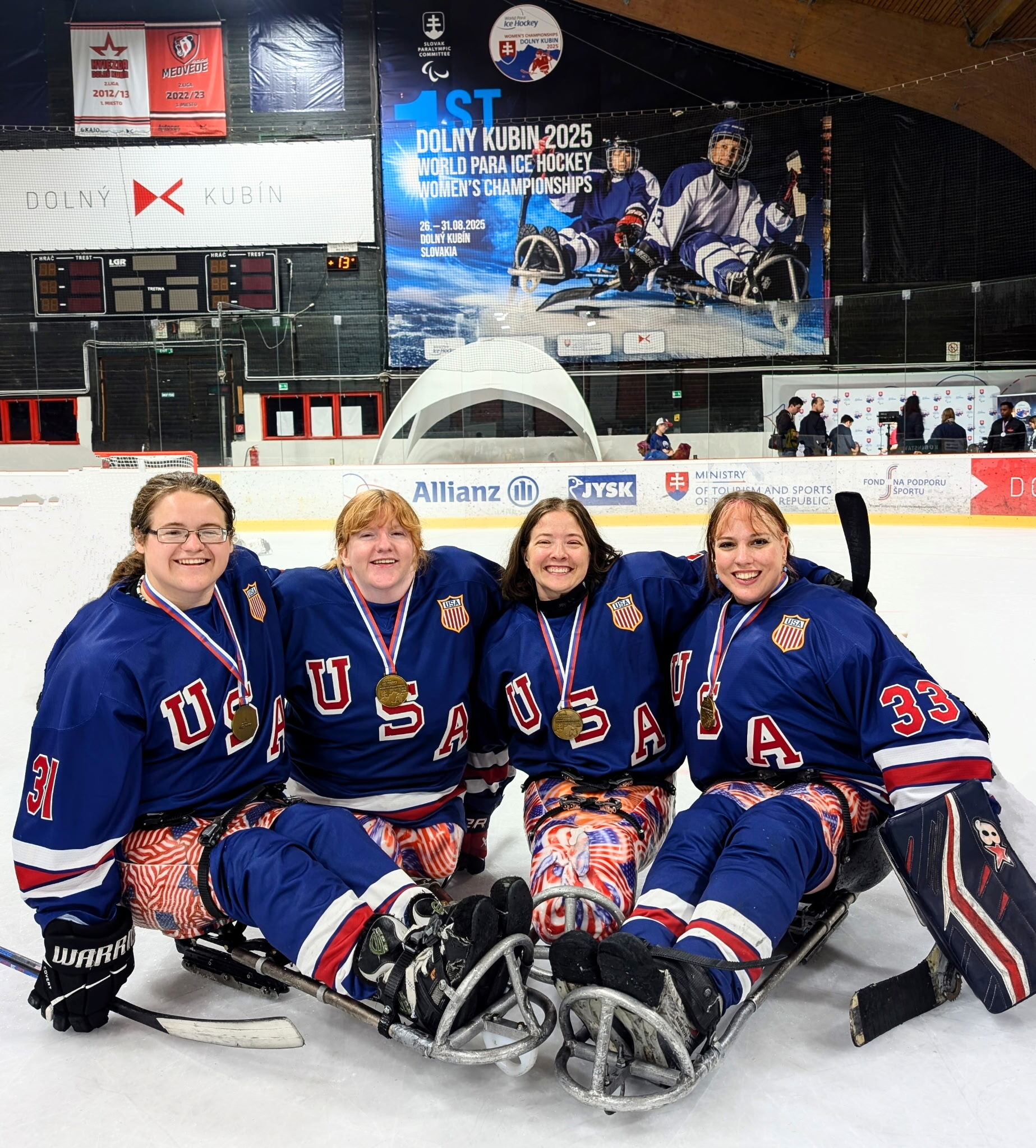
By Cris Villalonga-Vivoni, Staff Writer
The scrape of blades against the ice and the sharp whack of sticks meeting puck echo through the rink as players crash into one another. It could be any hockey game, but this one comes with a slight difference: the athletes are racing across the ice on sleds.
Sled hockey, a sport rapidly gaining momentum, blends the same intensity, speed, and physicality of traditional hockey with the accessibility of adaptive play.
This week, the first U.S. Women's National Sled Hockey Team was competing at the inaugural Para Ice Hockey Women's World Championship, taking place from Aug. 26 to 31 in Slovakia.
Among the roster are four players on defense — Rachel Grusse, Becca Mann, Hope Mallegky, and Robynne Hill — all members of the Gaylord Sports Association Wolfpack, Connecticut's only sled hockey team.
Other than using a sled, two sticks and a few rules, sled hockey really isn't all that different from playing hockey on skates, said Grusse. It's still full-contact, using a standard-size ice rink and nets.
But to Grusse and the other members of the national team, adaptive sports like sled hockey do more than provide a high-intensity, competitive game— they help level the playing field, bridging the gap between competition, inclusion, and possibility.
"When I was a kid, it was really frustrating to me, because I wanted to win things, but it was very difficult for me being like the only amputee in anything that I did," said Grusse over a virtual call, sitting alongside her teammates in Slovakia. "I think finding that community, like Robynne said, it's really helpful, honestly, and with the Wolfpack…it is like a family. We annoy each other, but we also love each other and we have each other's backs."
Sled hockey was invented in the 1960s at a Swedish rehabilitation center, slowly gaining international notoriety over the years.
The first U.S. national women's sled hockey team began in 2007 and was eventually incorporated into the USA Hockey brand and program as a development team in 2015. According to USA Hockey, the development team represented the U.S. in several international competitions, including the Women's Sled Series against Canada, and is the three-time champion of the Para Ice Hockey Women's World Challenge.
Yet, Hill said the team wasn't acknowledged as a fully-fledged national team until 2025.
A member of the national team since 2013, Hill, 29, started playing sled hockey as a 15-year-old, having since become her "niche." She was born with cerebral palsy and ZMIZ1, a gene linked to a rare neurodevelopmental disorder that impacts growth, learning and more.
Growing up, Hill said sports were her primary outlet, but over time, traditional games became too physically demanding to keep up with.
"My learning disability is gone. Yeah, it still affects me in practice, the plays, but I can skate with everybody else…you feel free, like your disability is not holding you back, and you can chase your dreams and do what you want," Hill said.
When she joined the national team in 2013, Hill said the players had to organize their own fundraisers, secure sponsorships, and even encourage other countries to form teams so they'd have opponents in international competition. Grusse joined Hill on the national team in 2015, followed by both Mann and Magellky in 2021.
Although the development team officially joined USA Hockey in 2018, Hill said the organization still considered them a development team because they had yet to reach the Paralympic level. It was formally changed, however, just before the inaugural world championship tournament. The players stated that the women's world championship is the next step towards qualifying for the Paralympics in 2030.
A little closer to home, Connecticut's only sled hockey team, the Wolfpack, started in 2003, before joining the Gaylord Sports Association in 2015, said Katie Joly, sports association program manager. They participate as part of the Northeast Sled Hockey League, competing against other teams across New England from September through May.
Most Wolfpack players are based in or around Connecticut, but Joly said the team has gradually grown to include athletes from much farther away — like Hill, who has flown in from her home state of Colorado to compete in games for the past three years.
It's a sport for everyone, regardless of ability, Joly said. One player — a physical therapist at Gaylord who also coaches the team — is not disabled but fell in love with the game and decided to grab a sled and stick.
"For someone who's an athlete that craves that kind of level of competitive sport, sled hockey can offer that if you're not able to, for whatever reason, to play stand-up hockey," Joly said.
Grusse, 33, is from Newington and has been involved with the Wolfpack for the last 13 years. As a bilateral below-the-knee amputee, she explored several adaptive sports growing up, going from swimming to wheelchair basketball before eventually falling in love with sled hockey.
Grusse, who's also missing a few fingertips, said growing up with a disability can be very isolating, but finding adaptive sports gave her a community of people who can relate to one another. Sled hockey ultimately levels the playing field at the recreational level, making it possible for anyone to participate in the sport.
Joly added that the Wolfpack is eager to welcome newcomers, encouraging anyone interested to give the sport a try or even join the team.
"We can all play competitively together, so nobody feels left out. I think that's a really wonderful thing," Grusse said. "That's not just true for sled hockey… Adaptive sports make it so that we are able to participate in these activities that we might not otherwise be able to participate in."
Building community, finding purpose
Becca Mann, 41, said she spent a few years "wandering" for her purpose after being medically discharged due to double below-the-knee amputations in 2016. She was looking for something that would fill a "void" of competition and community she left behind in the military.
After trying sled hockey for the first time in 2018 during a community event, Mann said she "was on a local team in the week…you get hooked quick and then it becomes a disease." Mann eventually got so good that she joined the national team in 2021.
The local team she was on eventually dissolved, which is when she joined the Wolfpack and roped in her now teammate, Hope Magellky, to join too. Mann, who lives in Massachusetts, often makes the three-hour drive to practice with the team and be in the community.
Not only did the national team and Wolfpack open her up to high-stakes competition, Mann said adaptive sports, like sled hockey, also have mental health benefits.
"I like adaptive mountain biking as well, and I also do downhill skiing, right? So different types of exercise...all of that stuff is key to my mental health, and I know that a lot of other folks feel that way too," Mann said. "Just like an able-bodied person going for a run, I think it opens doors in that respect."
Growing up with a form of cerebral palsy that impacted her legs, Magellky, 35, said there were no associations or programs for her to try adaptive sports in North Dakota. She never considered herself to be "athletic" because there were no avenues as a "disabled kid that couldn't keep up with anything."
Magellky discovered sled hockey seven years ago at a community event and jumped at the chance to play finally, especially after spending time working with a junior hockey team from the sidelines.
The introduction to adaptive sports and sled hockey, Magellky said, allowed her to try a new hobby, adapt and improve. What also keeps bringing Magellky back to the ice is the sense of community and mental health support the sport provides. It also pushes her to grow, constantly testing her physical and mental limits while giving her something new to learn.
"Anytime I'm on the ice, I'm taking away something new, or I'm tweaking something... it's really special to have this team and have this organization and all the support with it, because it's really like a family," she said. "It's really it's a really special thing to be a part of."
